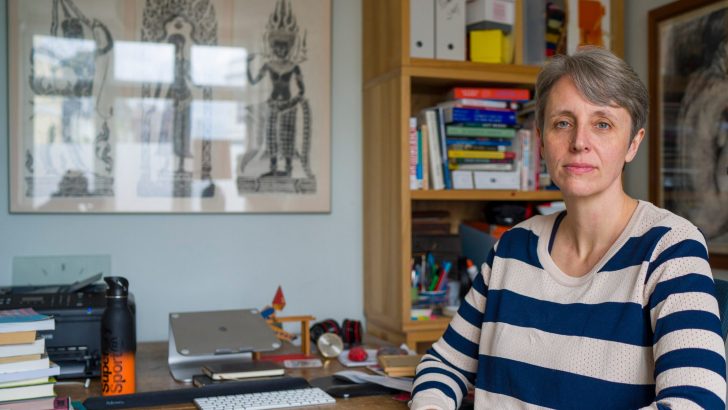The View
Have you ever felt that perhaps you should not say what you think to the people you are with? It’s a big question. In a land in which we proudly proclaim our rights and our freedoms, we can still be afraid to say what we think, and even what we believe, because of the response it may evoke.
Abortion
As Ireland debated and then introduced extended abortion, as we think about the calls for doctor-assisted dying – assisted suicide – and the arguments which have raged about children being given medication to stop their sexual development because they have decided that they no longer wish to be a little girl or a little boy, have you felt challenged because what you believe does not fit into what appears to be the public view of what is right? It happens, but in a free country in which there is a constitutional, legal right to freedom of speech it should not happen. Our right to freedom of expression, thought, conscience and religion has been hard won.
In turn we have the right to be heard, so long as we remain within the law in what we say and how we say it”
Of course all rights bring with them responsibilities and we must acknowledge those responsibilities and always act with respect while exercising our rights.
One of the things which every child should learn growing up is how to listen to others, how to hear views with which they do not agree, how to respond and to argue against the case which is being made if they disagree with it. This is part of how we form our views on what is right and wrong.
Traditionally in Ireland we have valued education. Our universities are supposed to be places of education which give the student, in the words of St John Henry Newman, “a clear conscious view of his own opinions and judgments, a truth in developing them, an eloquence in expressing them and a force in urging them.” In order to reach that place in which we know what we think and why we think it, we need to be able to listen to views we do not like, and to search for the truth, knowing that there is such a thing as truth, that everything is not relative, and that truth includes the fact that all life is sacred – no matter how it may seem diminished to some by its particular circumstances whether they are age, or disability or sickness. We need too, as life evolves, to be able to hear the challenges of a secular society which is not based upon a belief that God made each of us for purpose, that he loves each one of us even when we do not know it, and that that purpose is encapsulated by the commands to love God with all our hearts and souls and minds, and to love one another as he has loved us – utterly and without reserve or hesitation because we are all children of God and he lives in each one of us.
Modern secular society
As we contemplate the arguments of the modern secular society in which we live, we need to be ever cognisant of the need to hear what is being said and to be able to process it, respond to it with courtesy and to recognise the validity of truth which challenges us. In turn we have the right to be heard, so long as we remain within the law in what we say and how we say it. For this reason it has been very shocking over the past months to watch relentless attacks on people who do not proclaim what has become received wisdom. One of those people is a Professor of Philosophy at the University of Sussex, Kathleen Stock. She has spoken on issues relating to the importance of biological sex, about the emerging view that gender identity is a matter for self-selection, without considering the consequences – the need for single-sex spaces, especially for women – not allowing those who self-identify as women, having been born as men, to use women’s toilet and shower facilities, to be held in women’s prisons, to compete against female athletes.
The number of children presenting seeking treatment had increased by 400% over five years”
She has spoken out with great lucidity on what she calls the “emerging scandal of health care of trans-identified children”. It was reported In December 2019 that 35 psychologists had resigned from the Tavistock Institute in London over three years in protest at the treatment there of children who wanted to transition from one sexual identity to another with puberty blocking drugs and hormones. The number of children presenting seeking treatment had increased by 400% over five years. Children from Ireland had been travelling to England to get treatment there. The provision of puberty blocking drugs to young children was condemned by the High Court last in Britain month, when it said that these were experimental treatments which can no longer be given to children in most cases without the consent of the court. They said that it was highly unlikely that a child aged 13 or under would ever be competent to give consent to being treated with puberty blockers, that it was very doubtful that children aged 14 and 15 could have sufficient understanding of the long-term risks and consequences of such treatment to give consent and that doctors should involve the courts if there is any doubt as to whether the long-term interests of a 16 or 17 year-old would be served by treatment with puberty blockers and hormones.
Honour
As a consequence of her courage and her services to higher education Prof. Stock was recognised in the new year’s honours list. That honour was applauded by many of her peers but some 600 philosophers from universities across the word wrote a public letter condemning her. She is accused by her detractors of “transphobic fear-mongering” of “helping to restrict trans people’s access to life saving treatment” and of “encouraging the harassment of non-gender conforming people”. In fact she has publicly stated her support for the “right of trans people to live free of any violence, harassment or discrimination.” What she argues for is the right to discuss such matters, which relate to “women’s safety and autonomy and to children’s health and to democracy itself”. She wants to draw attention to the “suppression of critical thought about gender identity ideology and trans activism in UK universities”.
Critical thought
That suppression of critical thought on a range of issues is a feature of life in the world in which we now live. Kathleen Stock is not the only person who has been vilified for expressing opinions which are not consistent with contemporary views. Other academics and thinkers, journalists like our own Breda O’Brien have been ‘de-platformed,’ ‘cancelled,’ criticised, condemned and attacked for expressing their honest understanding of profound and fundamental facts. We need to be able to contemplate with objectivity the consequences of the decisions made in and by the society in which we live.
Freedom of thought, belief and religion is critical to the functioning of our democratic society. We must not allow it to be eroded and we must have the courage to stand up and say what we believe and know, and to support and encourage those like Kathleen Stock who have spoken out on critical issues. They must not be silenced.


 Nuala O’Loan
Nuala O’Loan Prof. Kathleen Stock who has been under pressure for expressing her views.
Prof. Kathleen Stock who has been under pressure for expressing her views. 